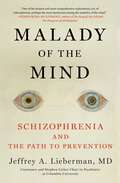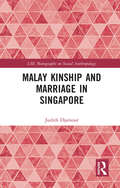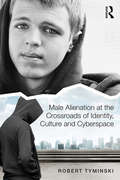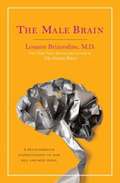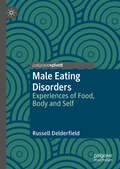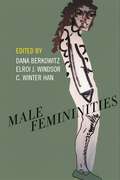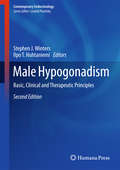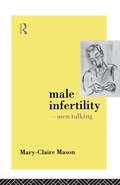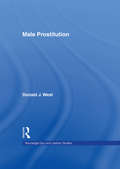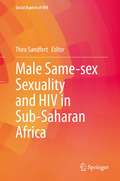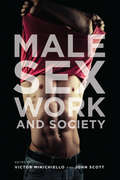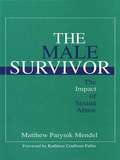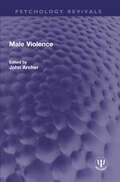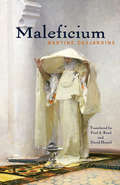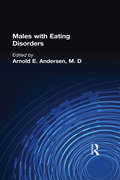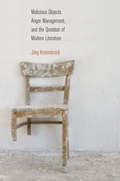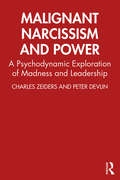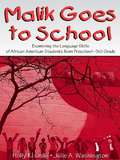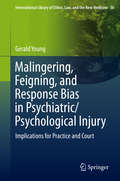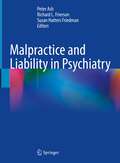- Table View
- List View
Malady of the Mind: Schizophrenia and the Path to Prevention
by Jeffrey A. Lieberman&“The most important book about schizophrenia in decades, and perhaps ever…a total game-changer.&” —Sylvia Nasar, author of A Beautiful Mind A comprehensive, deeply researched, and highly readable portrait of schizophrenia—its history, its various manifestations, and how today&’s treatments have promising and often lifesaving potential.This &“incredibly captivating&” (Siddhartha Mukherjee, author of The Emperor of All Maladies) portrait of schizophrenia, the most malignant and mysterious mental illness, by renowned psychiatrist Jeffrey Lieberman, interweaves cultural and scientific history with dramatic patient profiles and clinical experiences to impart a revolutionary message of hope. For the first time in history, we can effectively treat schizophrenia, limiting its disabling effects—and we&’re on the verge of being able to prevent the disease&’s onset entirely. Drawing on his four-decade career, Dr. Jeffrey Lieberman expertly illuminates the past, present, and future of this historically dreaded and devastating illness. Interweaving history, science, and policy with personal anecdotes and clinical cases, Malady of the Mind is a rich, illuminating experience written in accessible, fluid prose. From Dr. Lieberman&’s vantage point at the pinnacle of academic psychiatry, informed by extensive research experience and clinical care of thousands of patients, he explains how the complexity of the brain, the checkered history of psychiatric medicine, and centuries of stigma combined with misguided legislation and health care policies have impeded scientific advances and clinical progress. Despite this, there is reason for optimism: by offering evidence-based treatments that combine medication with psychosocial services and principles learned from the recovery movement, doctors can now effectively treat schizophrenia by diagnosing patients at a very early stage, achieving a mutually respectful therapeutic alliance, and preventing relapse, thus limiting the progression of the illness. Even more promising, decades of work on diagnosis, detection, and early intervention have pushed scientific progress to the cusp of prevention—meaning that in the near future, doctors may be able to prevent the onset of this disorder. A must-read for those interested in medical history, psychology, and those whose lives have been affected by schizophrenia, this &“penetrating, important&” (Andrew Solomon, author of Noonday Demon) work offers a comprehensive scientific portrait, crucial insights, sound advice for families and friends, and most importantly, hope for those sufferers now and future generations.
Malay Kinship and Marriage in Singapore (LSE Monographs on Social Anthropology #Vol. 21)
by Judith DjamourDr Djamour spent two years in Singapore, both in the city and in a Malay fishing village, and her first-hand account draws a lively and sympathetic picture of behaviour within the family and between kinsmen. It is nonetheless an important contribution to social anthropology and discusses, as its central topic, the instability of Malay marriage. The causes and consequences of this phenomenon, which involve social, economic, and psychological considerations, are analysed in some detail. The social picture which emerges has wide validity throughout the country and should prove of value to all who seek a fuller knowledge of Malay society.
Male Alienation at the Crossroads of Identity, Culture and Cyberspace
by Robert Tyminski"I’m broken." When a boy or man says this, he is expressing deep alienation from himself and the world. Something’s wrong, and he usually cannot begin to explain why. What brings boys and men into psychotherapy or analysis? Many of them struggle with access to their inner worlds. Experiences of alienation can lead to destructive and self-destructive behaviors, including addiction and violence. This book explores the reasons for this and considers why boys and men seek professional help. How do psychotherapists and analysts engage them when they often protest that they want to be left alone? Looking at the male psyche from boyhood through adolescence and into adulthood, Male Alienation at the Crossroads of Identity, Culture and Cyberspace provides examples from clinical practice, current events, art, and literature that show what happens when alienation is severe and leads boys and men to discharge their emotional problems in the outside world. The book examines compulsive internet use, flawed concepts of masculinity, difficulties with mutually intimate relationships, trouble showing emotions, and identity issues, as well as the role of fathers, with a focus on the types of fathers that many boys and men describe as being difficult. Tyminski provides various practical ideas about working with boys and men to encourage them to be open to their inner worlds, and emphasizes a contrast between having meaningful contacts or having a merely transactional approach to relating. Male Alienation at the Crossroads of Identity, Culture and Cyberspace will be essential reading for Jungian analysts, psychotherapists, and psychoanalysts as well as a wide range of other professionals who work with men and boys.
The Male Brain: A Breakthrough Understanding of How Men and Boys Think
by Louann BrizendineFrom the author of the groundbreaking New York Times bestseller The Female Brain, here is the eagerly awaited follow-up book that demystifies the puzzling male brain. Dr. Louann Brizendine, the founder of the first clinic in the country to study gender differences in brain, behavior, and hormones, turns her attention to the male brain, showing how, through every phase of life, the "male reality" is fundamentally different from the female one. Exploring the latest breakthroughs in male psychology and neurology with her trademark accessibility and candor, she reveals that the male brain: *is a lean, mean, problem-solving machine. Faced with a personal problem, a man will use his analytical brain structures, not his emotional ones, to find a solution. *thrives under competition, instinctively plays rough and is obsessed with rank and hierarchy. *has an area for sexual pursuit that is 2.5 times larger than the female brain, consuming him with sexual fantasies about female body parts. *experiences such a massive increase in testosterone at puberty that he perceive others' faces to be more aggressive.The Male Brain finally overturns the stereotypes. Impeccably researched and at the cutting edge of scientific knowledge, this is a book that every man, and especially every woman bedeviled by a man, will need to own.Praise for The Female Brain:"Louann Brizendine has done a great favor for every man who wants to understand the puzzling women in his life. A breezy and enlightening guide to women and a must-read for men."--Daniel Goleman, author of Emotional Intelligence From the Hardcover edition.
Male Eating Disorders: Experiences of Food, Body and Self
by Russell DelderfieldThis book takes a novel approach to the study of male eating disorders – an area that is often dominated by clinical discourses. The study of eating disorders in men has purportedly suffered from a lack of dedicated attention to personal and socio-cultural aspects. Delderfield tackles this deficiency by spotlighting a set of personal accounts written by a group of men who have experiences of disordered eating. The text presents critical interpretations that aim to situate these experiences in the social and cultural context in which these disorders occur. This discursive work is underpinned by an eclectic scholarly engagement with social psychology and sociology literature around masculinities, embodiment and fatness, belonging, punishment, stigma, and control; leading to understandings about relationships with food, body and self. This is undertaken with a reflexive element, as the personal intersects with the professional. This text will appeal to students, scholars and clinicians in social sciences, humanities, and healthcare studies, including public health.
Male Femininities
by Dana Berkowitz Elroi J. Windsor C. Winter HanInnovative essays that explore how men perform femininity and what femininity looks like without womenWhat counts as “male femininity”? Is it simply men behaving in effeminate ways or is it the absence of masculinity? Male Femininities presents a nuanced, critical collection of essays that highlight the extent to which male femininities are neither an imitation of femaleness nor an emptying of masculinity. These innovative essays focus on both gay and straight men, and transmasculine and genderqueer people in their construction and performance of femininity, thereby revealing the possibilities that open up when we critically examine femininity without women. Male Femininities asks, What does femininity look like for men?The contributors—highly regarded scholars and rising stars—cover a range of topics, including drag queens, cosmetic enhancements, trans fertility, and gender-non-conforming childhoods. Male Femininities illuminates what happens when we decouple femininity from female bodies and how even the smallest cracks and fissures in the normative order can disrupt, challenge, and in some cases reaffirm our existing sex-gender regime. This volume pluralizes the concept of male femininities and leads readers through an exploration of how gender, sex, and sexuality are manifested in the United States today.
Male Hypogonadism
by Stephen J. Winters Ilpo T. HuhtaniemiNow in a revised second edition, this comprehensive text covers all aspects of male hypogonadism from the basic science to clinical management, comprehensively explaining and applying new insights to the treatment of hypogonadal men. Chapters covering neuroendocrine control of testicular function, Leydig cell function, spermatogenesis, and normal and delayed puberty open the book. The focus then turns to the pathophysiology and treatment of hypogonadism and other forms of testicular dysfunction, such as Klinefelter syndrome, cryptorchidism, and disorders of the pituitary, as well as reproductive and endocrine consequences of cancer treatment, environmental factors, obesity and aging. Next are chapters that describe the available options for androgen replacement therapy, and the outcomes when men with hypogonadism of various causes are treated with testosterone, as well as a chapter devoted to current approaches to stimulating spermatogenesis in gonadotropin-deficient men. Highly practical and updated with the latest available data, this second edition of Male Hypogonadism: Basic, Clinical and Therapeutic Principles cogently presents a large body of scientific information on male reproductive endocrinology to provide a thorough understanding of the pathophysiology, clinical characteristics, and treatments for disorders that adversely affect testicular function.
Male Infertility - Men Talking
by Mary-Claire MasonHow do men react to diagnosis of male infertility and how, if at all, are all their lives affected by it? Male infertility is commonplace yet the male experience of it has been woefully neglected. Male Infertility - Men Talking explores these issues by gathering together men's stories and seeing what common strands, if any, exist between them. Mary-Claire Mason explores the past and present medical management of male infertility as this forms an essential backdrop to the men's stories but the main emphasis is on how men's lives are affected. In the first half of this book the discovery of sperm and the man's role in reproduction is considered together with a review of how the past affects the present medical management of male infertility and the problems that bedevil it. The male voice predominates in the second painful events and relationships with families and friends, their feeling of isolation, their medical experiences, the importance of biological fatherhood, and their hopes for the future.
Male Prostitution
by Donald West JHere is the most comprehensive empirical study ever published about male prostitutes and their clients. Written by one of the most distinguished international scholars in psychiatry and criminal justice, this book provides a carefully designed presentation of in-depth interviews with several hundred London “rent boys.” The interviews included a large sample of one-to-one conversations in a private room tape-recorded with the consent of the interviewees. Dr. West and his colleague, Mr. de Villiers, bring you squarely into the everyday lives of male prostitutes and cover little known details of their lives, such as: the drift into homelessness sexual orientation entry into prostitution sexual orientation threats of blackmail, violence, and murder by male prostitutes or their clients attitudes and intentions of the male prostitutes post-prostitution careers, legal and criminology issues personal fears, desires, and interests of male prostitutesEncyclopedic in scope and depth, Male Prostitution never strays from combining high-level research presented in a readily understandable and often entertaining style and incisive insights and issues critical for both the informed layperson and researchers in human sexuality. Dr. West and his colleague provide is a source of unbiased, detailed information on the male sex industry and their clients which is unavailable in any other book published to date.
Male Same-sex Sexuality and HIV in Sub-Saharan Africa (Social Aspects of HIV #7)
by Theo SandfortThis book addresses the impact of HIV on populations of men who have sex with men in Africa and local responses to the issue. It documents the enduring existence of a rich variety of same-sex practices between men. More critically, it analyses how the denial and social rejection of same-sex sexuality, together with the legacy of criminalization by former colonial rulers, has not only fueled the transmission of HIV between men, but has also impeded an effective response. The book also documents some of the outstanding progress that has been made and acknowledges the differences between African countries. Through its focus on lived realities and grassroots activism in Africa, this book will appeal to researchers, policy makers and practitioners alike.
Male Sex Work and Society
by John Scott Victor MinichielloThis new collection explores for the first time male sex work from a rich array of perspectives and disciplines. It aims to help enrich the ways in which we view both male sex work as a field of commerce and male sex workers themselves.Leading contributors examine the field both historically and cross-culturally from fields including public health, sociology, psychology, social services, history, filmography, economics, mental health, criminal justice, geography, and migration studies, and more.Synthesizing introductions by the editors help the reader understand the implications of the findings and conclusions for scholars, practitioners, students, and members of the interested/concerned public.
Male Sexuality
by Michael BaderAt first glance the sexual male seems easy to understand, but beneath the surface lie complexities that disrupt lives and relationships. Respected psychologist Michael Bader takes an honest look at the nuances of male sexuality, addressing issues such as sexual boredom, internet sex, and sexual fantasies that can leave women bewildered and men ashamed. Illustrated with engaging examples from his practice, Male Sexuality gives readers, both women and men, deeper understanding of male behavior. Through increased awareness of the psychology behind the sex, Bader aims to enhance individual self-esteem and improve communication in relationships.
Male Sexuality: A Guide to Sexual Fulfillment
by Bernie ZilbergeldA humane, sympathetic, commonsensical book on men, sex and pleasure.
The Male Survivor: The Impact of Sexual Abuse
by Matthew Parynik MendelThis landmark study examines the largest clinical sample to date of male survivors of sexual abuse in childhood. Using data from his nationwide North American survey, the author reveals that such abuse is extensive, thus dispelling myths regarding the invulnerability of males. Mendel argues that various societal myths have led to a profound under-recognition of male childhood sexual abuse. He proposes that increased attention to, and acknowledgement of, male victimization is needed in order to reduce both the stigma and isolation of male survivors and the incidence of abuse. The author also suggests modifications to conceptual frameworks related to the long-term impact of childhood sexual abuse to apply specifically to male
Male Violence (Psychology Revivals)
by John ArcherFirst published in 1994, Male Violence examines male violence as the major source of human suffering from a wide range of perspectives. This book contains accessible contributions from a wide range of psychologists who have studied the many faces of male violence: in childhood and adulthood; on the street and in the home; towards men, women and children; and in its sexual and non-sexual forms. These varied topics, together with an emphasis on naturalistic rather than laboratory-based investigations, distinguish these researchers from those aiming to make generalizations about human aggression without considering the issues of sex and gender. In doing so, Male Violence raises fundamental questions about values which are accepted and unchallenged by the majority of people living in the modern world. This book will be of interest to students of psychology, sociology, and gender studies.
Maleficium
by Fred A. Reed Martine Desjardins David HomelMartine Desjardins delivers to readers of Maleficium the unexpurgated revelations of Vicar Jerome Savoie, a heretic priest in nineteenth century Montreal. Braving threats from the Catholic Church, Savoie dares to violate the sanctity of the confessional in this confession-within-a-confession, in which seven penitents, each afflicted with a debilitating malady or struck with a crippling deformity, relates his encounter with an enigmatic young woman whose lips bear a striking scar.As these men penetrate deep into the exotic Orient, each falls victim to his own secret vice. One treks through Ethiopia in search of wingless locusts. Another hunts for fly-whisks among the clove plantations of Zanzibar. Yet others bargain for saffron in a Srinagar bazaar, search for the rarest frankincense, and pursue the coveted hawksbill turtle in the Sea of Oman. Two more seek the formula for sabon Nablus in Palestine or haggle over Persian carpets in the royal gardens of Shiraz. The men's individual forms of punishment, revealed through the agency of the young woman, are wrought upon their bodies.Baroque in its complexity, Kafka-like in its inexorable mechanics, Maleficium by turns astonishes, amuses, and beguiles. Then author Martine Desjardins's Vicar Savoie-as in any confession worth its communion wafer-saves the best (or worst) for last.Maleficium won the Prix Jacques Brossard and was a finalist for the Governor General's Literary Award (French Fiction), the Prix des libraires du Québec, the Prix des cinq continents de la Francophonie, and the Prix France-Québec.
Males With Eating Disorders (Eating Disorders Monographs #No.4)
by Arnold E. AndersenFirst published in 1990. Routledge is an imprint of Taylor & Francis, an informa company.
Malicious Objects, Anger Management, and the Question of Modern Literature
by Jörg KreienbrockWhy do humans get angry with objects? Why is it that a malfunctioning computer, a broken tool, or a fallen glass causes an outbreak of fury? How is it possible to speak of an inanimate object’s recalcitrance, obstinacy, or even malice? When things assume a will of their own and seem to act out against human desires and wishes rather than disappear into automatic, unconscious functionality, the breakdown is experienced not as something neutral but affectively—as rage or as outbursts of laughter. Such emotions are always psychosocial: public, rhetorically performed, and therefore irreducible to a “private” feeling. <p><p> By investigating the minutest details of life among dysfunctional household items through the discourses of philosophy and science, as well as in literary works by Laurence Sterne, Jean Paul, Friedrich Theodor Vischer, and Heimito von Doderer, Kreienbrock reconsiders the modern bourgeois poetics that render things the way we know and suffer them.
Malignant Narcissism and Power: A Psychodynamic Exploration of Madness and Leadership
by Charles Zeiders Peter DevlinUsing psychodynamic theory and riveting case material, this book dissects the figure of the malignant narcissist leader (MNL). Across the world today, individuals and societies are impacted by unprecedented disruptive influences, from globalization and climate change to economic uncertainty and mass migration. The rise of populists and would-be saviors has promised certainty for anxious populations, but how far are such leaders suffering from the MNL pathology? Through the psychoanalytic lens of Otto Kernberg, the authors explain the etiology of the charismatic MNL’s clinical features: charisma, grandiosity, criminality, sadism, and paranoia. The book outlines the limitations and complexity of diagnosis, contextualizing the MNL within the transcendental and millenarian movements, and discusses the patho-dynamics of high-pressure groups and totalitarian regimes, including types of groups, methods of mind control, categories of constituents, the corporate totalitarian state, and the authoritarian demagogue. The book looks at a wide range of leaders including Donald Trump, Bhagwan Shree Rajneesh, Roger Ailes, Keith Raniere, Jan of Leiden, and Credonia Mwerinde. Distinguishing the disordered personality of the MNL from other personality disorders, and presenting a new model of overlapping descriptors to categorize high-pressure group types and identifying types of followers as well, this book represents essential reading for psychodynamically minded psychologists, psychiatrists, social workers, sociologists, political scientists, and those working in organizational development.
Malignant Self Love
by Samuel VakninThe first ever book about narcissistic abuse, Malignant Self-love: Narcissism Revisited offers a detailed, first hand account of what it is like to have Narcissistic Personality Disorder. It contains new insights and an organized methodological framework. The first part of the book comprises more than 100 Frequently Asked Questions (FAQs) regarding relationships with abusive narcissists and the Narcissistic Personality Disorder.
Malik Goes to School: Examining the Language Skills of African American Students From Preschool-5th Grade
by Holly K. Craig Julie A. WashingtonMalik Goes to School: Examining the Language Skills of African American Students From Preschool-5th Grade synthesizes a decade of research by the authors, Holly Craig and Julie Washington, on the oral language and literacy skills of African American children from preschool to fifth grade. Their research has characterized significant influences on the child's use of AAE and the relationship between AAE and aspects of literacy acquisition. The research has also led to the characterization of other nondialectal aspects of language development. The outcome has been a culture-fair, child-centered language evaluation protocol.This very readable volume will be important to students, clinicians, and teachers, learning about and working with, African American children. The book has direct relevance to academic planning, clinical decision-making, curriculum development, and educational policymaking.
Malingering, Feigning, and Response Bias in Psychiatric/ Psychological Injury
by Gerald YoungThis book is a comprehensive analysis of the definitions, concepts, and recent research on malingering, feigning, and other response biases in psychological injury/ forensic disability populations. It presents a new model of malingering and related biases, and develops a "diagnostic" system based on it that is applicable to PTSD, chronic pain, and TBI. Included are suggestions for effective practice and future research based on the literature reviews and the new systems, which are useful also because they can be used readily by psychiatrists as much as psychologists. In Malingering, Feigning, and Response Style Assessment in Psychiatric/Psychological Injury, Dr. Young ambitiously sets out to articulate and synthesize the polarities involved in the assessment of response styles in psychological disabilities, including PTSD, pain, and TBI. He does so thoroughly and very even-handedly, neither minimizing the degree that outright faking can be found in substantial numbers of examinees, nor disregarding the possibility that there can be causes for validity test failure other than malingering. He reviews the prior systems for classifying evidence of malingering, and proposes his own criteria for feigned PTSD. These are conservative and well-grounded in the prior literature. Finally, the book contains dozens of very recent references, giving testament to Dr. Young's immersion in the personal injury literature, as might be expected from his experience as founder and Editor in Chief for Psychological Injury and the Law. Reviewer: Steve Rubenzer, Ph. D. , ABPP Board Certified Forensic Psychologist
The Malleability of Intellectual Styles
by Li-Fang ZhangIntellectual styles are individuals' preferred ways of using the cognitive abilities that they possess. The extent to which one can change his or her intellectual style is a question of interest to both researchers and the general public. This book presents the first comprehensive and systematic review of existing research on the malleability of intellectual styles. By critically analyzing research findings derived from both cross-sectional and longitudinal investigations performed over the past seven decades, Li-fang Zhang demonstrates that intellectual styles can be modified through both socialization and purposeful training. Professor Zhang elucidates the heuristic value of these findings for the development of adaptive intellectual styles in both academic and nonacademic settings. She proposes further avenues of research that might advance scholarly understanding of the nature and the potential for modifying intellectual styles.
Malpractice and Liability in Psychiatry
by Peter Ash Richard L. Frierson Susan Hatters FriedmanThis book comprehensively educates psychiatrists about malpractice and other liability. It is written to also specifically assist psychiatrists who are sued or are involved in other complaints. The first two sections discuss malpractice law and the litigation process; the litigation section mainly addresses some of the more emotionally charged issues, including do’s and don’ts, how an attorney will be looking at the case, the defendant doctor’s testifying at deposition and trial, and the stress of being sued. The subsequent three sections address specific topics that give rise to liability, with each section taking a different perspective such as risks in particular clinical, by practice site, and special issues, including practice in special situations such as the current pandemic. The final section discusses other forms of liability, such as complaints to medical boards or professional association ethics committees. An exceptional work, Malpractice and Liability in Psychiatry, functions as both a go-to handbook and all-encompassing read on the aforementioned topics.
Malthus
by Robert J. MayhewThomas Robert Malthus's An Essay on the Principle of Population was an immediate succès de scandale when it appeared in 1798. Arguing that nature is niggardly and that societies, both human and animal, tend to overstep the limits of natural resources in "perpetual oscillation between happiness and misery," he found himself attacked on all sides--by Romantic poets, utopian thinkers, and the religious establishment. Though Malthus has never disappeared, he has been perpetually misunderstood. This book is at once a major reassessment of Malthus's ideas and an intellectual history of the origins of modern debates about demography, resources, and the environment. Against the ferment of Enlightenment ideals about the perfectibility of mankind and the grim realities of life in the eighteenth century, Robert Mayhew explains the genesis of the Essay and Malthus's preoccupation with birth and death rates. He traces Malthus's collision course with the Lake poets, his important revisions to the Essay, and composition of his other great work, Principles of Political Economy. Mayhew suggests we see the author in his later writings as an environmental economist for his persistent concern with natural resources, land, and the conditions of their use. Mayhew then pursues Malthus's many afterlives in the Victorian world and beyond. Today, the Malthusian dilemma makes itself felt once again, as demography and climate change come together on the same environmental agenda. By opening a new door onto Malthus's arguments and their transmission to the present day, Robert Mayhew gives historical depth to our current planetary concerns.
